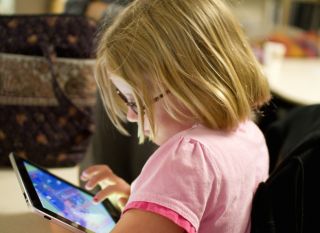Media
Are Screens “Drugging” Your Child’s Brain?
Your young child’s brain on “devices” and what you can do.
Posted September 2, 2014

Given the use of computers and tablets in school and for homework requiring Internet access, it is unrealistic for families to forego technology completely. But, allowing it to replace play, peer interaction and family time or to become the dominant form of socializing can be detrimental when digital device use is not kept in check.
Your child’s brain on “devices”
Parents face difficult choices about technology, but new research makes some decisions easier. If over-decorated classrooms distract and reduce learning, imagine what frenetic, fast-changing screen images do to young children’s minds.
Anna Fisher, Associate Professor of Psychology at Carnegie Mellon University and her colleagues looked at the effects of decorated vs. blank kindergarten walls on the students’ learning and ability to maintain focus on instruction.
In the kindergarten study, the researchers changed the visual environment (decorated vs. undecorated walls) to teach six basic science lessons. The result: “Children were more distracted by the visual environment, spent more time off task, and demonstrated smaller learning gains when the walls were highly decorated than when the decorations were removed.”
I recently wrote How Digital Devices Affect Infants and Toddlers; it explains why “screen” time for babies and very young children is developmentally risky. Extensive “screen” time for elementary school age children is equally unwise.
Douglas A. Gentile and other researchers monitored third, fourth, and fifth grade students In Iowa and Minnesota both in-home and in-school using data supplied by parents or caregivers and teachers. They found that parental monitoring of their children’s media use improved children’s sleep and curbed aggressive behavior as well as boosted academic performance. Not surprisingly, monitoring and limiting time spent on media have positive, “protective effects.”
Are screens “drugging” your child’s brain?
In a Wall Street Journal article reflecting on his 3-1/2-year-old’s iPad use and the nightly dilemma of prying the device away, Ben Worthen rightly notes, “Many apps for kids are designed to stimulate dopamine releases—hence creating a kind of “reward system” and encouraging a child to keep playing—by offering rewards or exciting visuals at unpredictable times.” That would explain why children become entranced by television and games they play on screens. The additive aspect of apps and games holds for many games and apps created for school-age children—and adults—as well.
Many recent apps and games aimed to educate young minds simply distract or mesmerize. Referring to cellphone addiction and iPad use, Dr. David Greenfield, the founder of The Center for Internet and Technology Addiction and Assistant Clinical Professor of Psychiatry at The University of Connecticut School of Medicine, underscores that excessive screen users are drugging their brains no matter what their age.
Yet parents seem to fear a child with nothing to do will be bored and have no problem handing over their own smartphone or iPad to insure their child will be occupied. Sherry Turkle, Professor of the Social Studies of Science and Technology at MIT and the founder and current director of the MIT Initiative on Technology and Self, explains this fear in her book, Alone Together: Why We Expect More From Technology and Less From Each Other: “Learning about solitude and being alone is the bedrock of early development, and you don’t want your kids to miss out on that because you’re pacifying them with a device.”
Parents must choose a delicate balance. The authors of “Protective Effects of Parental Monitoring of Children’s Media Use” that appeared in Pediatrics point out, “Considering that children average more than 40 hours of screen time a week, not counting time spent on a computer at school, even small changes can make a difference.” It’s not necessarily about eliminating screen time altogether, but rather finding a healthy balance.
As children move into middle school and high school, not surprisingly, it becomes more difficult for parents to limit screen time, a topic that will be addressed in a forthcoming post with suggestions on how to tackle the potential takeover of “screens” during adolescence.
Related: How Digital Devices Affect Infants and Toddlers; The Big Disconnect: Parents’ Digital Dilemma; Apps to Track Baby’s Milestones: Obsessive or Helpful? ; Facebook Posts That Put Your Kid in Jail
Resources:
Fisher, Anna et. al. “Visual Environment, Attention Allocation, and Learning in Young Children When Too Much of a Good Thing May Be Bad.” Psychological Science. 21 May 2014. http://pss.sagepub.com/content/early/2014/05/20/0956797614533801.abstract
Fisher, Lauren. “How Serious is Your Smartphone Addiction?” HarpersBazaar.com, 12 Aug 2014. http://www.harpersbazaar.com/culture/features/smartphone-addiction
Gentile, Douglas A. et. al. “Protective Effects of Parental Monitoring of Children’s Media Use.” JAMA Pediatrics, 2014; DOI: 10.1001/jamapediatrics.2014.146
Turkle, Sherry. Alone Together: Why We Expect More From Technology and Less From Eachother. New York: Basic Books, 2012. http://www.amazon.com/Alone-Together-Expect-Technology-Other/dp/0465031463
Worthen, Ben. “What Happens When Toddlers Zone Out With an iPad.” The Wall Street Journal. 22 May 2012
Photo credit: nooccar via photopin cc
Copyright @ 2014 Susan Newman
· Follow Susan Newman on Twitter and Facebook
· Sign up for Dr. Newman's monthly Family Life Alert Newsletter
· Visit Susan's website: www.susannewmanphd.com
· See Susan’s latest book: The Case for the Only Child: Your Essential Guide




